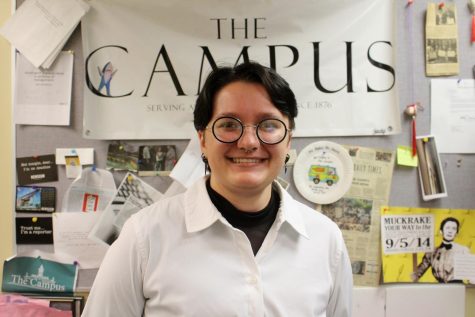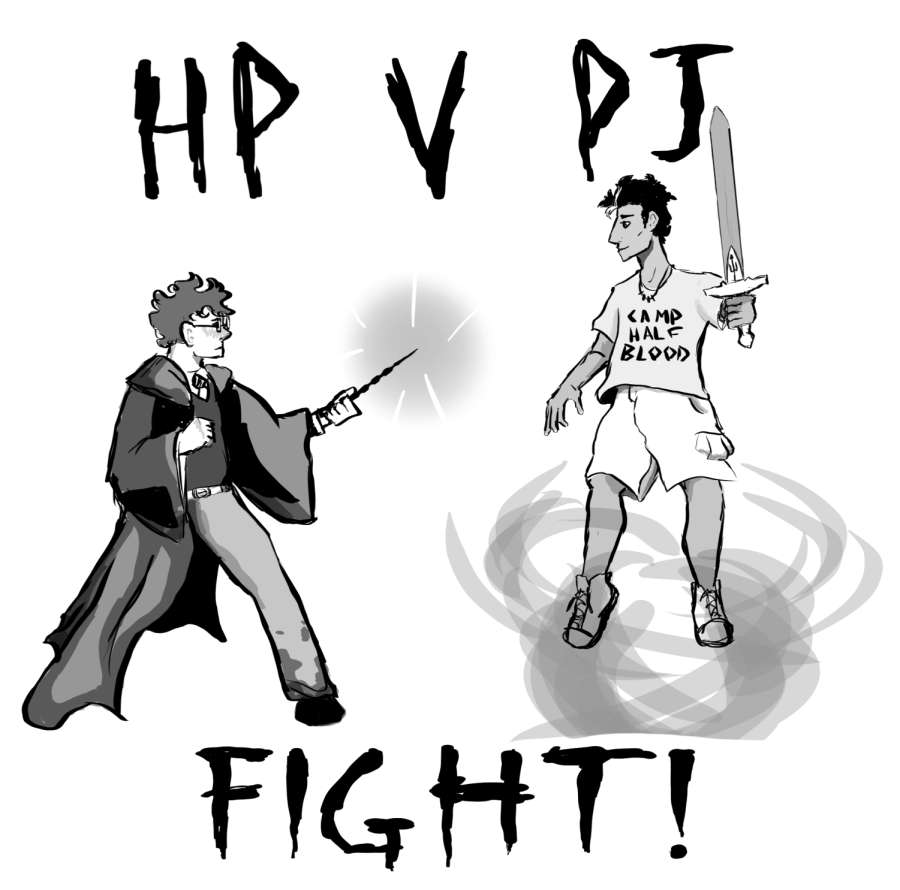Percy Jackson is better than Harry Potter
Growing up a bookworm, I have read most, if not all, fantasy children’s books. My first book without pictures happened to be “Percy Jackson: The Lightning Thief.” Soon after, I became obsessed with finding more books with excellent world building and relatable characters. In my search I found the “Harry Potter” series.
Looking back at both series, I now realize how many positive messages my young impressionable mind got from the “Percy Jackson” series. The same can not be said about the “Harry Potter” series.
My biggest issue when comparing the series were the messages each institution gave. In the “Percy Jackson” series, Camp Half-Blood is a safe place for kids with godly heritage to be protected from evil forces. Hogwarts also is meant to be a safe place for young wizards to hone their craft with peers, but Camp Half-Blood is the only place that lives up to its promise.
Within the walls of Hogwarts exist worse beings than pale-faced men without noses: the professors. In every book of the “Harry Potter” series, blatant child abuse occurs in the daily life of each child. Harry Potter himself is terrorized by Severus Snape with little consequence to the professor.
On top of being unsafe within the walls, the school permits Harry Potter to go back to a life of child abuse with the Dursleys during the summer. After going to all the trouble of recruiting Harry Potter to Hogwarts, they fail to provide the same efforts in helping his summer living situation. In contrast, Camp Half-Blood provides a safe haven for many campers year-round in order to keep them protected from the dangers of the underworld and neglectful families.
Some might argue that Dionysus, the head of Camp Half-Blood, is not exactly the nicest to the campers. However, Dionysus never harms any of the campers despite his joking that he will. It struck me as odd that Dionysus, someone who is cursed to be the head of the camp, treats the campers better than the professors at Hogwarts that choose to be there.
While reading “Harry Potter,” I noticed how many instances of questionable behaviors from characters were brushed over in the series.
The first issue I noticed from the first book was the slur “mudblood” being used against students like Hermoine Granger. I expected consequences for the students who used the universe’s equivalent of a racial slur, but it was always brushed over. Another among these issues is the slavery and abuse of elves used by mainly the rich. The rich in “Harry Potter” seem beyond empathy, but somehow the books tried to convince me to ignore all their problematic behavior with one redeeming action per book — specifically the actions of Draco Malfoy.
Besides the moral issues I had with the series, my main issue was how unnecessarily long each book was. The first two books were not as bad, but right around the middle of “Harry Potter and the Prisoner of Azkaban,” I wanted to stop reading. One of the things I appreciated most of the Percy Jackson series was the variety of villains in each book. It may be personal preference but I did not enjoy that for such a long series, the main villain in each “Harry Potter” book always had a similar agenda. Additionally, it is important to note that Percy Jackson chooses to go on the quests in which he encounters mythological creatures. The quests he chooses to go on are full of adventure and stay true to the quirky tone of the series no matter how dire the situation. In the end of each book, Percy Jackson continuously demonstrates a humble attitude and tries to change the dynamics between gods and their children so that they can become accountable for their actions. It was interesting to read that even gods in the series were expected to change despite the mythology indicating their fixed ways.
In contrast, the “Harry Potter” series continuously showed the inability of some characters to change and there were many times where the main characters became arrogant and unlikeable. For example, Harry Potter and his friends never listened to the professors to stay away from danger because they believed they could succeed where the professors would fail.
Some may ask why the lessons in morality and the examples that main characters set matter. Despite the wide adult fan base, these are some of the first long books children will read. Books have immeasurable impacts on young minds which is why it is important that the lessons we learn from children’s books stay true to what we want to see in a progressive society.
In short, Percy Jackson and Harry Potter both succeed in captivating their audience but only one of them succeeds in sending a positive message to the reader about what it means to be a true hero.

Evelyn Zavala is a senior from San Francisco. She is majoring in Business and minoring in Journalism in the Public Interest. This is her fourth year on...

Kai Maries is a Senior from Girard, Pennsylvania. They are a History major with minors in Studio Art and Classical Studies. They make comics for the campus...







Craig bourne • Sep 24, 2022 at 4:09 am
Honestly I could not say it better myself, you are correct one other thing you missed was the positive spin on learning disabilities that Rick includes in his series. Or the point that the Percy Jackson series makes of it being ok to be different. Whereas harry is ostracized for being different in many of the books, whether it be his muggle upbringing, parseltongue or his orphan status.
Shar • Sep 24, 2022 at 3:33 am
I don’t think your comparison is apt. Maybe because I read Harry Potter as an adult, I don’t believe a book must appeal to the moral side of people’s conscience. And bad things did happen in Camp half blood too. For example, Percy was almost killed by Luke.
Truth is I would have agreed with you sometime ago. But I’ve read both PJ and HP twice and I believe HP is one of the best books ever written.
Kaleigh White, '22 • Oct 1, 2022 at 3:27 am
Surely you’re joking. Despite being a Harry Potter fan, I can without hesitation admit that the writing is TERRIBLE. The world building is poor, and contradicts itself constantly. There is racism, antisemitism, and more woven through the pages. I can acknowledge that Harry Potter had an insane impact on society – and could even write about it, I’m sure – but I cannot believe that there are people out there who genuinely think the writing of Harry Potter is in any way “good.”
Also, JK Rowling is a terf. So there’s that.
E • Mar 21, 2024 at 12:58 pm
I have read both Harry Potter, and Percy Jackson, and I recpectfully disagree. Maybe it’s the fact hat I read Harry Potter first, but Harry Potter has always had the charm that Percy Jackson lacked for me. Even if Harry Potter had some questionable subjects, I strongly believe that it has better messages then Percy Jackson. I think that the world would be a sad place without Harry Potter, and it dosen’t at all matter if JK Rowling isn’t a good person. The series has serious subjects to warn against and shine the light on the topics, not to encourage them. The impact of Harry Potter on society was generally good, and I don’t think that a lot of people would have mentally surrived without the series. I love Percy Jackson, but it will never have the place in my heart that Harry Potter has forged. Harry Potter is a great series that deserves to be remembered forever, and I think that you are simply focusing on the bad.
Aiden Z • Apr 23, 2024 at 7:30 pm
I know I am joining into this conversation but I would have to agree that Percy Jackson is better. I read Harry Potter before I read Percy Jackson and love Harry Potter so much, it will always have a special place in my heart but I would say that Percy Jackson has better character development and teaches kids and adults that difference is okay. Heck almost all the kids at Camp-Half blood are dyslexic and have ADHD. While Harry Potter supports slavery and what is practically racism. These are both amazing books but I would have to say that Percy Jackson has better morals.